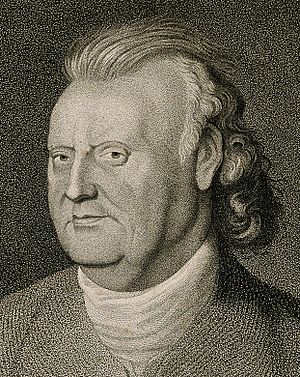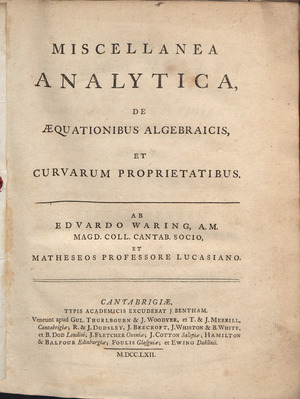Edward Waring facts for kids
Quick facts for kids
Edward Waring
|
|
|---|---|

Waring (ca. 1736–1798). Portrait by Thomas Kerrich, 1794.
|
|
| Born | c. 1736 Old Heath, Shropshire, England, Kingdom of Great Britain
|
| Died | 15 August 1798 (aged 62) Plealey, Pontesbury, Shropshire, England
|
| Nationality | British |
| Alma mater | Magdalene College, Cambridge |
| Known for | Waring's problem Waring's prime number conjecture |
| Awards | Copley Medal (1784) |
| Scientific career | |
| Fields | Mathematics |
| Institutions | University of Cambridge |
| Notable students | John Wilson John Dawson |
Edward Waring (around 1736 – 15 August 1798) was a very important British mathematician. He joined Magdalene College, Cambridge as a student who needed financial help. He quickly became the top mathematics student in his year in 1757.
He was later chosen to be a Fellow at Magdalene College. In 1760, he became the Lucasian Professor of Mathematics. This was a very high position at Cambridge University. He held this job until he passed away. Waring is famous for something called Waring's problem. He wrote about it in his book Meditationes Algebraicae. He was also elected a member of the Royal Society in 1763 and won the Copley Medal in 1784.
Contents
Early Life and School
Edward Waring was the oldest son of John and Elizabeth Waring. His parents were successful farmers. He went to Shrewsbury School for his early education.
In March 1753, he started at Magdalene College, Cambridge. Even then, people could see his amazing talent for mathematics. In 1757, he earned his first degree and was the best math student, known as the senior wrangler. A year later, he became a Fellow at Magdalene College.
A Career in Mathematics
In late 1759, Waring published the first part of his book, Miscellanea Analytica. Just a month later, in January 1760, he was given the job of Lucasian Professor of Mathematics. This was one of the most important math jobs at Cambridge.
Some people, like William Samuel Powell, didn't think Waring should get the job because he was very young. He also didn't have his Master of Arts degree yet, which was usually needed. But the King himself gave Waring the degree in 1760. This allowed him to keep the professor job.
In 1762, he published the full Miscellanea Analytica. This book was mostly about number theory and algebraic equations. In 1763, he became a member of the Royal Society, a famous group of scientists. He won their Copley Medal in 1784. He left the society in 1795 when he was over 60, saying it was "on account of [his] age." Waring was also a member of science groups in other countries, like Göttingen and Bologna.
He earned a medical degree in 1767, but he didn't practice medicine much. He was very shy and had poor eyesight, which made it hard for him to be a doctor.
Personal Life
Edward Waring had a younger brother named Humphrey. Humphrey also became a Fellow at Magdalene College in 1775.
In 1776, Waring married Mary Oswell. They moved to Shrewsbury and later to Plealey, a village outside the town. Waring owned a large piece of land there.
Waring's Important Work
Waring wrote many papers for the Philosophical Transactions of the Royal Society. These papers covered topics like solving algebraic equations, number theory, and how numbers in a series behave.
His book Meditationes Algebraicae (1770) was a bigger and better version of his earlier work. Another famous mathematician, Joseph-Louis Lagrange, called it "a work full of excellent researches." In this book, Waring shared many new ideas about solving algebraic equations.
But his best work was in number theory. He wrote about the Goldbach conjecture, which suggests that every even number (except 2) can be made by adding two prime numbers. He also thought that every odd number is either a prime number or the sum of three prime numbers.
Waring is most famous for Waring's problem. He suggested that every positive whole number can be written as the sum of a certain number of powers. For example, every positive whole number can be made by adding no more than four squares (like 1, 4, 9, 16). He also thought that every positive whole number is either a cube (like 1, 8, 27) or the sum of no more than nine cubes. And he guessed that every positive whole number is either a biquadrate (a number to the fourth power) or the sum of no more than nineteen biquadrates.
Waring also published a theorem from his friend John Wilson about prime numbers. This theorem was later proven to be true by Lagrange.
In his book Proprietates Algebraicarum Curvarum (1772), Waring worked on classifying different types of curves. He improved on the ideas of other famous mathematicians like Isaac Newton and Leonhard Euler. In 1794, he wrote a philosophical book called An Essay on the Principles of Human Knowledge. He shared a few copies with his friends.
Waring liked to use a very detailed, analytical style in his math. He believed British mathematicians should learn more from those in other countries. He knew a lot about the work of famous European mathematicians like Alexis Clairaut and Leonhard Euler. He wanted British math to be as good as the math being done on the continent.
Waring's work was known in Britain and Europe. However, it's hard to say exactly how much it changed mathematics. His writing style was not always clear, and he didn't seem to give many lectures or write letters to other mathematicians.
Later Years and Death
In his last years, Edward Waring became very religious and sad. He caught a bad cold, which led to his death on 15 August 1798, at his home in Plealey. He was buried in the churchyard at Fitz, Shropshire.
See also
- Lagrange polynomial
 | Valerie Thomas |
 | Frederick McKinley Jones |
 | George Edward Alcorn Jr. |
 | Thomas Mensah |


